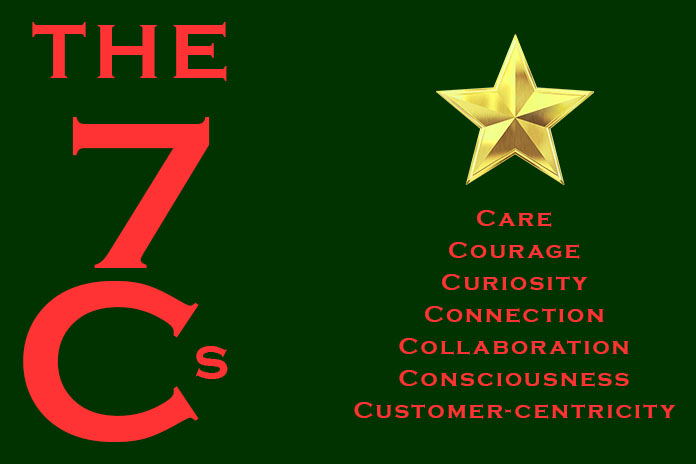
IF THE Industrial Age was about ‘product’ and the Information Age was about ‘data’, this Connected Age that we are in is about ‘meaning’.
Our future belongs to those people who can create meaning, facilitate understanding, take us on a journey of discovery and generate positive experiences that are valued, and that people are willing to pay for. Unfortunately for most professional services firms and the specialists that work in them, this is the antithesis of how they operate; it goes against their modus operandi.
So it follows that those who can translate the world into something that makes sense, who can create understanding and connection, will be the ones that flourish.
This is where value resides – those who can’t create such meaning, will be left behind.
What value do consultants and professional services firms create?
While the CEOs of global consulting firms have been claiming for a while now that more than half their revenue comes from non-traditional work, the reality is they are simply flogging a different suite of products and services, all built by specialists with little clue of where their worth resides or how to create true value for society.
The death knell is ringing for these consultants and their professional services firms. The future will look very different!
ALSO WATCH: WED WEB CHAT — Tips For Safe And Smart Remote Work
The Rise Of The Consumer
Meaning produces coherence in someone’s world, it gives purpose and it indicates significance. The creation of meaning is an experience and it is in this experience that one creates value. For professional services firms and their consultants, value no longer resides in the products they provide, like data, information and reports, but rather, it exists only in the experience their customer has.
While professional services firms might understand this, there is no evidence whatsoever, that they are ready or willing or, in fact, capable of making the leap to this new world. The upshot of this is that their relevance is being swiftly eroded. As they are unable to create value, there is little reason to exist.
The paradox here is that it is professional services firms that will tell you such a shift is occurring. In fact, they have labelled it a ‘megatrend’, where material consumption is being substituted for experiences, yet they fail to recognise how this impacts their traditional way of working.
Creating meaning is an experience.
In the Industrial and the Information Age, goods and products were the centre of economic activity. The participation of the consumer was minimal and the interaction between the producer and the customer was simply a transaction.
In this Connected Age, the centre of economic activity is the experience between producer and consumer, one that is co-created and rarely linear or one way. Whereas, in the past, ‘value’ resided in the product that was bought and sold in a transaction, it now exists in the experience that the parties create, together.
Research by Bain & Co. found 80% of companies believe they deliver superior customer service but that only 8% of customers believe that to be the case.
It is clear that businesses are not as good as they think they are when it comes to serving customers.
Smart organisations are looking for ways to truly connect with and please their customers, rather than trying to just sell customers more products. These organisations focus on delivering a better customer experience through untapping latent demand, uncovering problems and inspiring action to create a better future. And these smart organisations are not afraid to charge a premium for the value they create — it’s how they get away from having to compete on price for their products and services.
But to do this well requires a different approach, one that puts the customer at the centre of the relationship, rather than the revenue, internal KPIs or the sales goals of these professional services firms.
There are four monetary markers that indicate whether a business is putting the customer at the centre of the relationship: Increasing share-of-wallet; greater stickiness; word-of-mouth referrals and; and continual purchase behaviour. Anything less and ‘customer-centric’ is just another marketing slogan.
MORE AFTER THIS…

Means To What End?
My work mantra is: “You need to get clients to buy you and the experience you create. Your firm’s products simply exist to service your clients and are not how you create value or build a relationship.”
The mistake many firms are making is believing that ‘relationship excellence will follow task excellence’. It doesn’t. The reality is that ‘task excellence follows relationship excellence’. It is a statement of fact that, in this Concept Age, consultants need to have a great relationship before they can begin to understand what the right products and services are for a client.
Professional services firms have lots of great products but they are quickly degrading in value and will not be valuable in a future where their work will be outsourced to cheaper providers or simply automated. As such, their products are only good as a means to service the client relationship and ought not be the foundation of the relationship.
If the client has a relationship with the product then these firms are exposed to other businesses who can offer the products cheaper or quicker. In effect, products give firms a ticket to play.
Dhiraj Rajaram, founder and CEO of decision sciences company Mu Sigma, notes that “learning is more important than knowing, and experimentation is more important than expertise”.
In future, organisations will compete on their speed of learning; how quickly they can understand what customers value and use these insights as an input to design meaningful experiences for the customer. An organisation’s success will depend on its ability to create experiences that customers value.

The late Jerry Garcia of the Grateful Dead said something along these lines: It is not enough to be the best at what you do, you should try and be the only one who can do what you do!
To strive for Garcia’s benchmark, one must work much harder to understand customers and what they value. This requires tremendous curiosity and fierce empathy. Here, again, we run into problems for professional services firms: Empathy cannot be scaled and without it, one cannot build the deep levels of trust required to connect with others and engender meaningful experiences.
But it’s worth pursuing it, as once you get this empathy quotient right, no one will be able to copy what you do because no one will understand the customer like you do.
ALSO READ: The BMW 2 Gran Coupe Makes A Lively Debut
Get Personal
It is a fact (at least for now), that machines cannot build trust as they cannot demonstrate empathy. While empathy is the antecedent to future success, one must then be able to ‘deliver’ on the trust, and this requires a cognitive agility and organisational flexibility to create actual bespoke and extreme personalised services, rather than standardised, scalable products.
In a world where professional services firms value ‘expertise delivered at scale’ over ‘experimenting and learning’ there is little hope of them being liberated from competing with thousands of other firms who do what they do and certainly little possibility of facilitating a unique and meaningful experience.
When 70% of the buying experience is based on how a customer feels they are being treated (and nothing to do with the product they are buying), a different operating model is called for.
Data may have overtaken oil as the planet’s most valuable asset, but data is still just another product and not at the heart of a flourishing relationship. Empathy is.
Empathy is at the root of how people feel and the basis for how we create meaning. Empathy is also the precursor of agility; it is how we learn what the customer needs. Instructive here is the widely accepted notion that less than 10% of data produced is actually used to inform decision making.
So, while data might be the source of much revenue, it is certainly not creating meaning or driving the behaviour of those who purchase — what a vacuous, mindless treadmill we are on.
Nobel Prize winner, Sir William Bragg said, the important thing is not to uncover more facts (data or information), it is to discover new ways of looking at those facts. This is learning in action, this is the process of discovery, this is what is meant by provoking insights. The fact that Bragg said it sometime around 1914 shows how slow we have been to get up the curve.
In the world of professional services, to drive behaviour, such as decision making or organisational change, firms must create meaning because all behaviour and all action is an emotional response. Unfortunately, consultants and their professional services firms appear profoundly ill-equipped to create meaning for their customers — it’s not their game — they are too busy trying to create wealth for themselves.
ALSO READ: Minimum Wage — How Much…Or Little…Is Enough?
The 7 Cs
What professional services firms need is what I call the 7-Cs: Customer-centricity, Courage, Curiosity, Connection, Care, Collaboration, Consciousness.

At the centre of these is empathy. The reality is, however, that these are in short supply in most firms where they understand their clients’ businesses far better than they understand their clients. This makes it nearly impossible to achieve trust, commitment and engagement and the monetary markers.
Worse still, it makes it almost impossible to generate creative, innovative ideas; ones that are valued by the customer.
The more services are automated the more important empathy becomes; the more it is required for the remaining human interactions.
The roadblock here is that empathy and trust take time and they cannot be automated and scaled.
The modus operandi of a product-centric model is to find more and more customers for your products and services. The MO of a customer-centric model is finding more valuable ways to serve your customers.
A customer-centric model requires one to care for the customer, first-and-foremost, and this is a tough sell for professional services firms who primarily care about their own internal targets and goals and believe passionately that the road to achieving them lies in their knowledge and expertise.
The post Information Age demands radical changes in the way professional services firms operate. Operating to learn is so radically different to operating to make a profit or creating wealth. Listening to the customer, rather than being the expert is such a leap for most firms.
It’s a gloomy prospect, but most professional services firms are not agile enough to make this leap, to keep iterating their value proposition, to adapt and renew. One reason for this is that they do not collaborate well (experts rarely do) and are terrible at leveraging diverse thinking (it takes too long and is difficult to scale). Firms like this believe that information is proprietary and to be guarded rather than shared and collectively available. This makes it almost impossible to uncover any new ways of working or to co-create original solutions.
Firms like this have stopped learning how to learn — they simply value their knowledge, far too much.
Einstein said if he had a really difficult problem to solve and an hour to do it, he would spend 55-minutes thinking about the problem and the right questions to ask and then 5-minutes on the solution. Professional services firms have this ‘enquiry/solution ratio’ the wrong-way round and as such, either impose what they think the client needs, or push onto the client what they can deliver and charge for. This lack of understanding is a very real reason for such poor customer satisfaction levels.
ALSO WATCH: 10 Questions To Check If You Are Anxious Or Depressed
Individual Solutions
When nearly every good idea comes from customer intimacy and immersion, all customer interactions must be profoundly individual and unique and they must be less standardised and homogenous.
What these firms fail to appreciate is that they are in the people business. If you have customers, you are in the people business and your value resides in the experience you create when you interact with those customers.
Here, one’s area of expertise ought to be regarded as a ‘threshold’ domain — it’s required to enter the industry and one needs to be great in a specialist field, but beyond this, it is not the difference between sustained success and poor levels of customer satisfaction. Even if what a firm offers is by far and away the best in the market, it is only a matter of time before it is copied or replicated by others at a cheaper price or automated and democratised.
There is this fallacy that talk is a waste of time and that it reduces efficiency, but every study shows that conversation increases productivity and helps people build relationships that uncover real needs and opportunities.
In this sense, this talk, this conversation, this time spent, is the value proposition. It is in conversation where ideas are created and unfold, where futures are born.
Expertise and knowledge should only be relevant in that they give consultants a ticket to the conversation. Beyond this, they are of little relevance. With the pace of change today and our ensuing diffused attention, we have lost our capacity to make meaningful connections and to engage authentically with others. In this state, our ability to demonstrate empathy and create value vanishes.
This Connected Age requires consultants to walk into client interactions with little certainty, it requires them to be vulnerable, unsure of what they are going to say and do. It requires them to ‘operate to learn’.
This dive into the unknown is often too much, and saying, ‘I don’t know’ is still viewed as a death-wish in an industry where ‘certainty’ is the specialist’s ‘stock-in-trade’. The upshot is, this Connected Age takes specialists far out of their comfort zone and leaves them rudderless in an open-ended world that cannot be standardised.
Dom Meli is the founder of boutique consultancy People At Their Best. The views expressed in this article are those of the author.
If you have a topic that is of interest, or have someone who would make a good panellist with a thought-provoking perspective on a subject, please email editor@storm-asia.com with your details and a short summary.



















